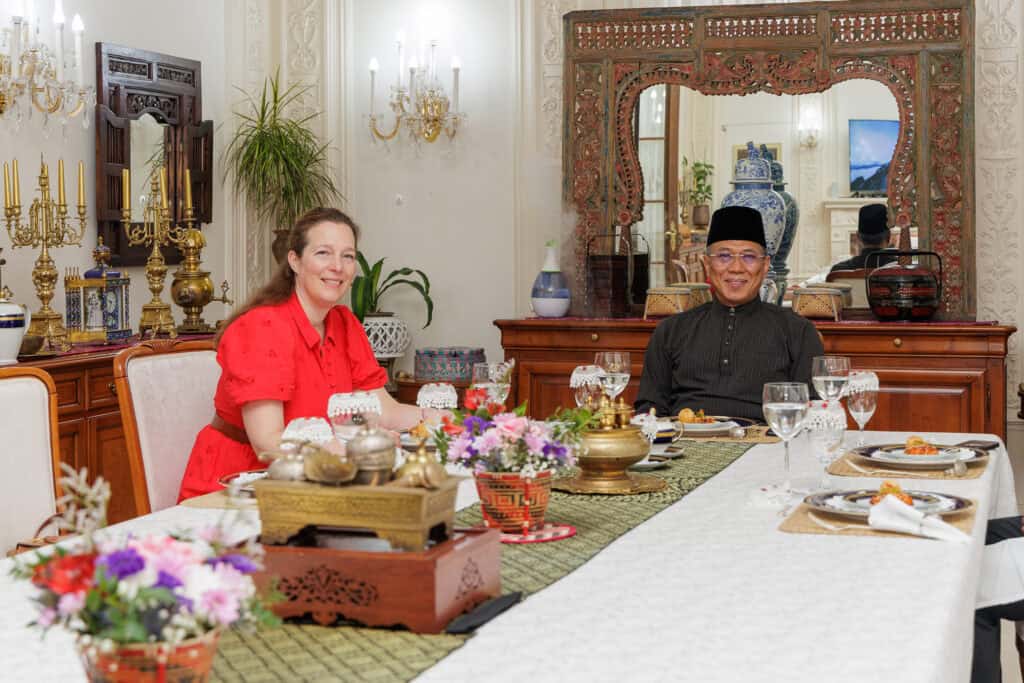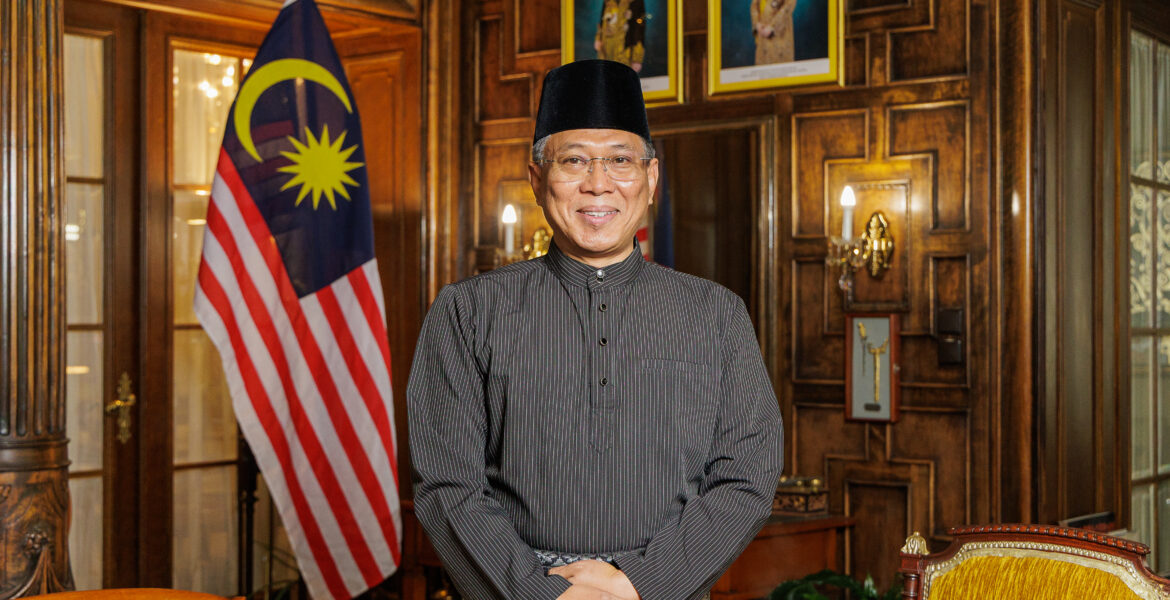Diplomatic SOCIETY met with H.E. Ikram Bin Mohd Ibrahim, to talk about the relations between Malaysia and Austria and the ASEAN chairmanship.
For around four years now you are representing Malaysia as Ambassador to Austria – what were the highlights and biggest achievements for you?
The Malaysia-Austria ties have been further strengthened during my tenure (September 2021-July 2025), especially in conjunction with the 60th anniversary of our diplomatic relations in 2022. In terms of visits, four Ministers, namely Home Affairs, Science, Technology and Innovation, Law and Institutional Reform, and Housing and Local Government as well as our Deputy Foreign Minister – came to Vienna, while the Bilateral Consultations mechanism, established in 2023, had its inaugural meeting in Putrajaya in May 2024. Economic ties improved substantially, where total trade with Austria for the 2021-2024 period stood at €3.5 billion and the Austrian investments in Malaysia amounted to €3 billion.
As Permanent Representative to the International Organisations, I have had the privilege of serving as Governor in the IAEA BoG (2021/22), Chair of the ASEAN Vienna Committee (January-June 2022), Chair of the Group of Asia and the Pacific States (May-November 2023) as well as Vice President of the 20th Session of the UNIDO General Conference (2023/25), 12th Session of the IACA Assembly of Parties (AoP) (2023/24) and 68th Regular Session of the IAEA General Conference (2024/25).


As ASEAN Chair for 2025 – how does Malaysia plan to drive it forward and to address the challenges it is facing?
Our Chairmanship’s theme, „Inclusivity and Sustainability”, reflects the aspiration for a truly shared progress, ensuring that no one is left behind and underscoring ASEAN’s commitment to further strengthening regional peace, stability and prosperity within an inclusive, sustainable and future-oriented framework; and anchored on three overarching priorities – Strengthening ASEAN Centrality and Unity, Driving Inclusive and Sustainable Development, and Embedding Inclusivity and Sustainability across the ASEAN Pillars. The ASEAN Community Vision 2045, adopted during the 46th Summit in Kuala Lumpur on 26 May 2025, sets the strategic direction, including through the ASEAN Digital Economy Framework and ASEAN Sustainable Investment Guidelines.
ASEAN faces a complex set of challenges. Geopolitically, the South China Sea uncertainties and the situation in Myanmar affect regional unity and progress. Transnational threats continue to demand coordinated responses. Bridging the economic and development gaps remain urgent. The global geo-economic circumstances have added to existing pressures. We seek to address these challenges by enhancing cooperation, promoting a rules-based regional order and championing inclusive multilateralism through presenting a united, constructive regional front.
In April and after 12 years, Chinese President Xi visited Malaysia – how important are your country’s relations with China, which other countries are Malaysia’s key partners, and where do Austria and the EU rank?
In 1974, Malaysia became the first ASEAN Member State to establish diplomatic relations with China, a historic move and precedent-setting for other Southeast Asian nations. Today, our five-decade ties encompass extensive cooperation. China has been Malaysia’s largest trading partner for 16 consecutive years and one of the largest foreign investors. Capacity-building cooperation has grown rapidly. President Xi’s visit has further strengthened these ties, evidently through 31 MoU on economic, scientific and technological, and infrastructure cooperation – reaffirming both countries’ commitment to building a prosperous community.
Malaysia’s long-standing relations and comprehensive partnership with the EU and its Member States are indispensable. Malaysia remains a key EU strategic economic partner in SEA, with the bloc ranking as our fourth largest trading partner (€46.4 billion or 7.6% of our total trade) while Malaysia was the EU’s third largest trading partner within ASEAN. In 2023, the stock of EU FDI in Malaysia was €31.9 billion (second largest foreign investor) and the stock of our investment in the EU was €15.4 billion. In capitalizing on untapped potential, the Malaysia-EU FTA negotiations (launched in 2010 but paused in 2012) have resumed in June 2025. The EU supports Malaysia and the ASEAN Member States through cooperation in various areas. The ASEAN-EU relations are robust, with the EU being our Dialogue Partner since 1977, third largest trading partner and foreign investor, and provider of substantial foreign direct assistance.
Malaysia-Austria ties have a long history even prior to our independence, with earlier links established in the 19th century, and have grown steadily. Over the past decade (2015-2024), economic ties have expanded significantly, with total trade amounted to €6.4 billion, while the total investment by more than 50 Austrian companies in Malaysia was approximately €7 billion.
Your country practices a unique rotational form of monarchy. How does it work and what are its advantages?
The Constitutional Monarchy system, established upon the then-Federation of Malaya’s independence on 31 August 1957, prescribes a unique elective monarchy arrangement. The nine hereditary Malay Rulers elect the Yang di-Pertuan Agong (King) from among themselves, rotating the federal throne every five years premised on the power-sharing principle among the royal families – thus, integrating traditional monarchy within a modern parliamentary democracy. The Malays Rulers may also dismiss an incumbent monarch. The monarch’s role is largely ceremonial and symbolic, with most executive powers vested in the elected Government. However, the Yang di-Pertuan Agong retained discretionary powers, such as appointing the PM and withholding Parliamentary dissolution, and serves as the Supreme Commander of the Armed Forces. The system’s advantages include preserving national unity, ensuring political stability, exercising discretionary checks and balances, and preserving Islam and the culture and cultural practices of its people. For almost seven decades and with seventeen Yang di-Pertuan Agong to-date, this unique system is a successful blend of tradition and modern governance, helping to maintain a balanced and inclusive political structure while respecting its rich cultural heritage. The incumbent Yang di-Pertuan Agong XVII is H.M. Sultan Ibrahim from the State of Johor.
Last but not least, as the Malaysian tourism industry is growing, can you give us your personal recommondations for a trip to your country?
Malaysia has stunning natural beauty, rich cultural heritage and vibrant cities. Planning a trip, especially in 2026, is a fantastic idea in conjunction with the “Visit Malaysia 2026” campaign that highlights our unique blend of cultures, landscapes and experiences, and the fact that it is a family-friendly and eco-conscious travel destination. In terms of the best time to visit, Malaysia’s diverse geography means that weather patterns vary by region – the west coast of Peninsular Malaysia (including Kuala Lumpur, Langkawi and Penang) is best visited between March and October, while the ideal window for the east coast is March to September, and April to October for northern Borneo (Sabah and Sarawak). Start your journey in vibrant Kuala Lumpur, where skyscrapers coexist with cultural heritage. Head to Langkawi, a tropical island paradise; Penang, our cultural and culinary capital; Cameron Highlands, a serene hill station; and Melaka, a historical gem. In Sabah and Sarawak, nature and adventure take centre stage – climb Mount Kinabalu, dive into the Sipadan coral reefs, observe orangutans up close at Sepilok, and trek through untouched rainforests in Danum and Bako.

